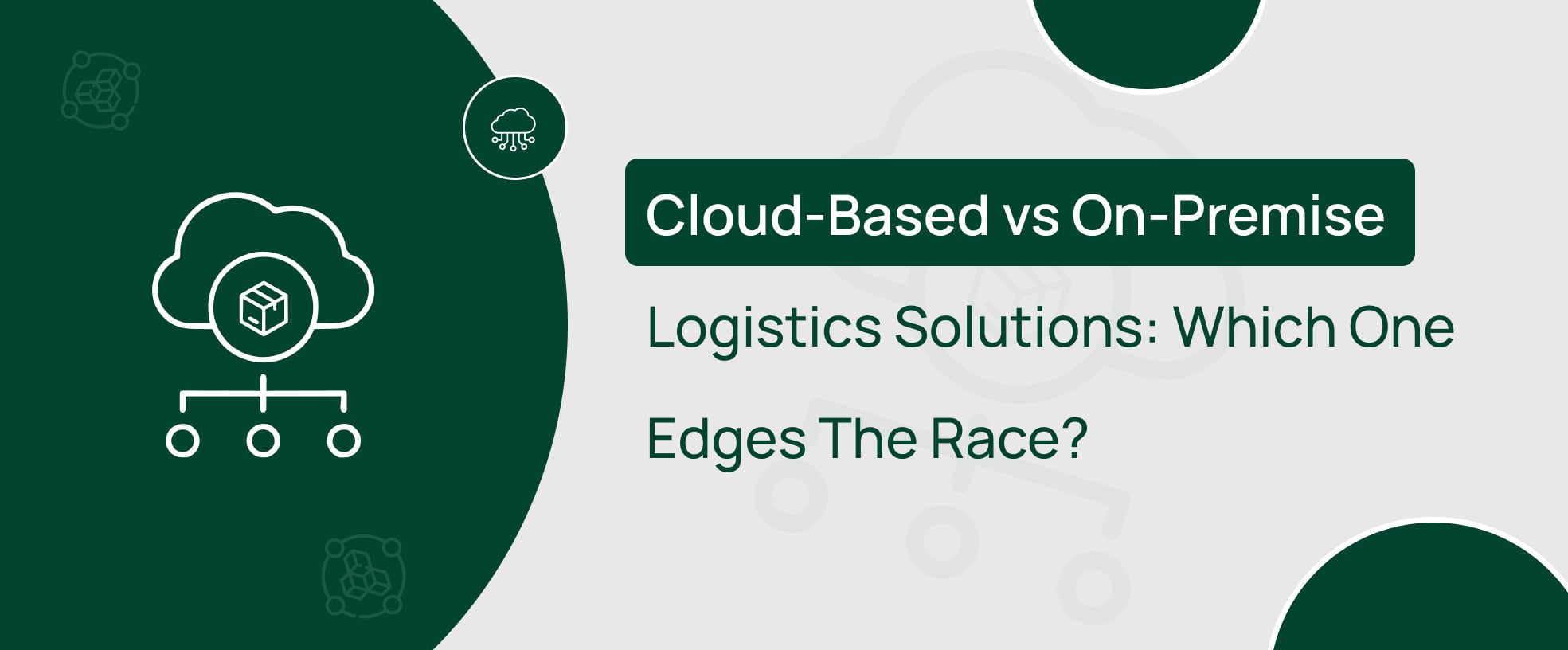Cloud-Based vs. On-Premise Logistics Solutions: Which One Edges The Race?

Like other businesses, do you get confused about Cloud-based vs. on-premise logistics solutions? Here is a comprehensive guide that explains these options.
The drastic rise of e-commerce industries has led to the evolution of Logistics software. As a business dealing with supplies, you want faster, more efficient, and hassle-free deliveries. But, like many others, you also get confused about what to choose: a cloud-based or on-premise LMS solution. No more!!!
This comprehensive guide on Cloud-based vs. on-premise Logistics solutions will help you make a better decision. It examines the pros, cons, and detailed features of each deployment model. Find out which one would work better for you.
A Brief Overview of Cloud-Based Vs On-Premise Logistics Solutions
Cloud-Based Logistic Solutions:
Cloud-based management software runs on remote servers hosted by a third party. This enables companies to manage inventory, transportation, orders, warehouses, and other logistics operations without owning any hardware or in-house servers.
On-Premise Logistic Solutions:
These Logistics solutions are installed on the company’s hardware and are more secure than cloud-based ones. However, they can be challenging in terms of scalability and maintenance.
Based on the data by Straitsresearch: The market’s largest contributor, the global on-premise logistics management software sector, is anticipated to expand at a compound annual growth rate (CAGR) of 8.59% throughout the course of the forecast period.Cloud-Based Vs On-Premise Logistics Solutions: Detailed Comparison
Cost Savings:
If you are on a budget, you should consider cloud-based Logistics solutions. They cost less than on-premise solutions. In cloud-based services, no initial investment in hardware is needed. Also, cloud-based services are subscription-based and hence cheaper. However, these costs can accumulate if not monitored in a timely manner.
Control:
Here, on-premise logistics management solutions are better since you have the required hardware and full control over the data. In the Cloud-based deployment model, you have to rely on third parties, which means dependency for control and maintenance.
Scalability:
Which SaaS Logistics vs. on-premise solutions is better for scalability? Cloud-based logistics solutions have far better scalability, as the available resources limit them. They can scale operations 50% faster than the traditionally used on-premise solutions. Hence, if you are a growing business with changing logistics needs, you should use cloud-based logistics.
Security:
One of the on-premise benefits of logistics management software is that it offers security advantages. Businesses with highly sensitive data or demanding regulatory compliance needs must depend on the on-premise Logistic Management Solution only.
As in the on-premise deployment model, you have complete control over the physical location of your data and hardware, which makes you better prepared against unauthorized access.
Also, with the on-premise, you have the choice of maintaining your own network security. Your data remains within your network, which minimizes its breach.
Maintenance:
When choosing an on-premise, you must maintain the installed hardware and software, and there are ongoing costs. On the other hand, the responsibility and burden of maintenance are on the third party that provides you with the service. They manage the servers, the storage, and the networking infrastructure.
They also manage things like bug fixes, security patches, etc. Hence, cloud-based services are better in terms of maintenance.
Increased Level of Collaboration:
Cloud-based logistics management improves collaboration among internal teams.It is a central hub where data is stored and accessible to authorities. When you choose cloud-based Logistics Management Solutions, you can access updated information in real-time, regardless of location. This helps in quicker decision-making.
Now, let us have an elaborative view of the advantages and disadvantages of cloud-based vs. on-premise logistics solutions.
Pros and Cons of Cloud-Based Vs On-Premise Logistics Solutions
Still confused about Cloud-based Vs On-premise Logistics Solutions? What you choose between them depends on your needs, business goals and budget. So, let us make their advantages and disadvantages distinctly clear.
-> Where on one hand, cloud-based Logistics solutions operate on the remote servers, on premise Logistics Management Software run on the local servers. Cloud based services are delivered in the form of SaaS or Software as a Service.
-> Businesses opting for cloud-based models have to pay as per their usage. They do not have to bear the burden of hardware and software installation.
-> On-premise deployment models are hosted on the local infrastructure and hence they give a better control over data security. Initial costs are high in this case but you get a better customization.
Cloud-Based Logistics Solutions Pros:
| Pros | Description |
|---|---|
| Lower Upfront Costs |
|
| Flexibility and Accessibility |
|
| Enhanced Security |
|
| Easy Usage |
|
| Eco-friendly Option |
|
Cloud-Based Logistics Solutions Cons:
There are certain disadvantages related to the cloud-based logistics solutions too. Here is a quick glimpse:
Data Security Concerns:
-> If you are a business dealing with sensitive logistics and the supply chain then you should not choose Cloud-based software. It is vulnerable to data breach and cyber attacks because it is handled by a third-party.
Interconnectivity Issues:
-> When you are comparing cloud based Vs on premise logistics solutions in terms of interconnectivity, go in for the on-premise. There may be delays to the real-time data access and updates due to unstable Internet.
There are other cons as well like recurring costs, limits of customization, data ownership concerns and complexity in integration too.
| Cons | Description |
|---|---|
| Data Security Concerns |
|
| Interconnectivity issues |
|
| Recurring costs |
|
| Limits of customization |
|
On-Premise Logistics Solutions Pros:
In the battle of cloud-based Vs on premise Logistics, it is difficult to say which one will be better for you. Both of them have their own set of advantages and disadvantages. Let us have a look at the pros of on-premise Logistics solutions now.
| Pros | Description |
|---|---|
| Increased Data Privacy and Security |
|
| Better Customization |
|
| Non Reliance on Internet Connectivity |
|
On-premise systems can be better customized to the specific needs of your businesses. Here in this case businesses are not constrained to the vendor’s capabilities.
Non Reliance on Internet Connectivity:
-> As on-premise solutions are not dependent on the Internet connectivity, they have hassle-free operations, anywhere and anytime. Apart from that, faster response time is expected because of the non-dependence on servers.
There are other On-premise security advantages as well like it is more scalable, and it does not need recurring costs in the form subscription fee.
On-Premise Logistics Solutions Cons:
There are certain cons attached to the on-premise Logistics solutions too.
| Cons | Description |
|---|---|
| Ongoing Maintenance Costs |
|
| Scalability Issues |
|
| Dependence on Internal Expertise |
|
Ongoing Maintenance Costs:
-> In house teams are required for the on-going maintenance, regular upgrades and for troubleshooting. Apart from the physical upkeep of the servers, there has to be periodic repairs and replacements. Software needs to be maintained too.
Scalability issues:
-> On-premise is not recommended for the growing business as expanding it needs additional infrastructure and hardware as well. Besides, scaling up the operations is also time consuming.
Dependence on Internal Expertise:
-> It needs a highly skilled team of IT personnel to meet any sort of operational challenges that may occur from time to time.
Apart from that, there are other disadvantages as well like downtime risks, poor accessibility, risks of downtimes, limited integrations and much more.
Conclusion:
In short, when you want to be clear about Cloud-based Vs On-premise Logistics solutions, there can be no winner. Both of them have their own advantages and disadvantages. Logistics solutions offer a better control, a better security and benefit of easy customization. Cloud-based Logistics Management solutions have no upfront cost as such and a better flexibility. So, what you choose, depends on what you need!
Taking complete control of your Logistics and being benefited from it has never been easy. What if you find the perfect solution for whatever deployment model you choose? CommuteLogix has delivered excellence for more than a decade. It is meant only for those who aim for high productivity, low-costs, complete transparency and profitability. So, do not give it a second thought and get in touch with us today.
If this guide was helpful, then make sure to check out the listicle of:
Top 11 Logistics management software solutions!
